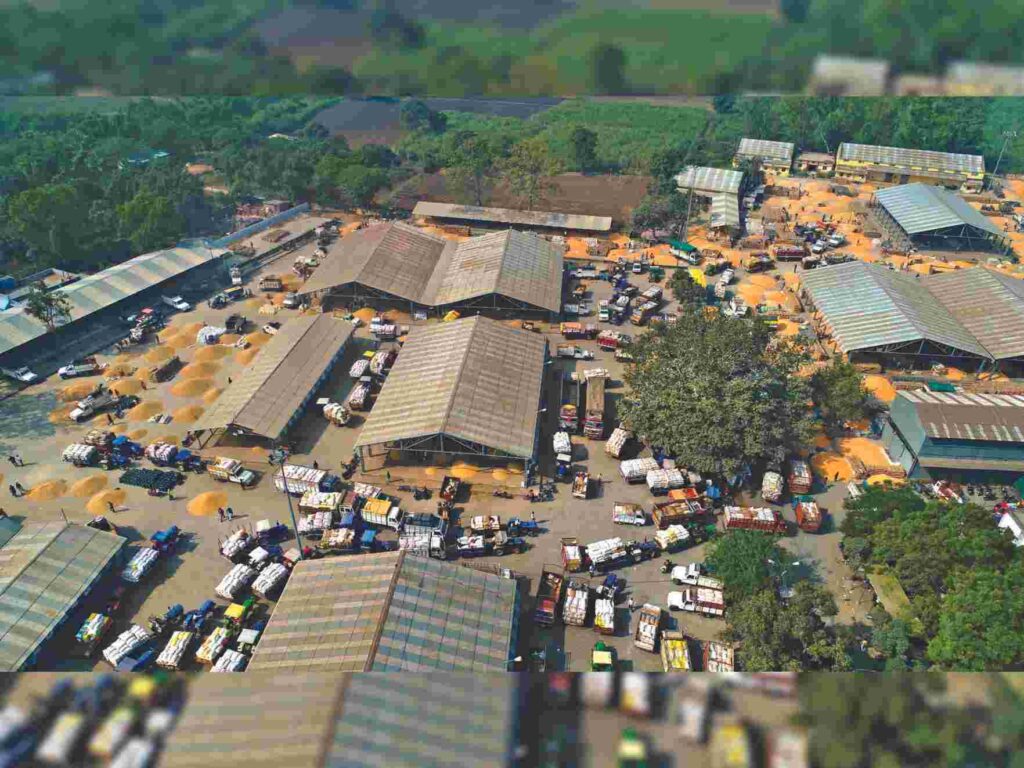Mandi मंडी
प्रस्तावना: मंडी एक अत्यंत महत्वपूर्ण शब्द है जो भारतीय कृषि और अर्थव्यवस्था के लिए महत्वपूर्ण है। यह एक ऐसा स्थान है जहाँ किसान अपने कृषि उत्पादों को बेचने आते हैं और खरीदते हैं। मंडी एक महत्वपूर्ण बाजार होती है जो भारत की कृषि व्यवस्था को सुदृढ़ करने में मदद करती है। इस लेख में, हम मंडी के महत्व, विशेषता, विकास, और इसके प्रभावों पर चर्चा करेंगे।
मंडी का महत्व: मंडी एक महत्वपूर्ण संस्थान है जो किसानों को उनके उत्पादों को विपणन करने का माध्यम प्रदान करती है। यह कृषि उत्पादों के खरीद-दारों और बेचने वालों के बीच एक मध्यस्थ पारंपरिक तरीके से काम करती है। मंडी में विभिन्न प्रकार के फसलों को एक साथ खरीदा जाता है और इसके बाद उन्हें बाजार में बेचा जाता है। यहाँ कुछ मुख्य कारण हैं जिनके कारण मंडी का महत्व है:
- उत्पादकों को सुरक्षा: मंडी किसानों को उनके उत्पादों को सुरक्षित रूप से बेचने का मौका देती है। यह उन्हें दरार के बिना अधिक मूल्य पर उनके उत्पादों को बेचने का अवसर प्रदान करती है।
- खरीद-दारों को सुविधा: मंडी किसानों के लिए न केवल उत्पादों को खरीदने की सुविधा प्रदान करती है, बल्कि उन्हें विभिन्न फसलों की मूल्यों की तुलना करने का भी मौका देती है।
- वित्तीय स्थिरता: मंडी के माध्यम से किसान अधिक मूल्य पर अपने उत्पादों को बेचकर अधिक आय प्राप्त कर सकते हैं, जिससे उनकी वित्तीय स्थिरता में सुधार होता है।
- आर्थिक विकास: मंडी बाजारों का गठबंधन क्षेत्रों के आर्थिक विकास में महत्वपूर्ण भूमिका निभाती है। इनके माध्यम से जगहीं नौकरियां बनती हैं और लोगों को आर्थिक विकास के अवसर प्राप्त होते हैं।
मंडी की विशेषता: मंडी बाजार विशेष रूप से कृषि उत्पादों की खरीद-दारों और विक्रेताओं के बीच एक अहम संवाद केंद्र होता है। यहाँ कुछ मुख्य विशेषताएँ हैं:
- विविधता: मंडी बाजारों में विविधता होती है, जिसका मतलब है कि यहाँ अलग-अलग प्रकार की फसलें और उत्पादों का बाजार होता है। यह विविधता किसानों को अपने उत्पादों को अधिक मूल्य पर बेचने का विकल्प देती है और खरीद-दारों को विभिन्न विकल्पों का चयन करने की स्वतंत्रता प्रदान करती है।
- दरार की रोकथाम: मंडी बाजार दरारों को रोकने का माध्यम प्रदान करती है। किसान अपने उत्पादों को सीधे खरीद-दार को बेचते हैं और दलालों या मध्यस्थों के माध्यम से नहीं। इससे उन्हें अधिक मूल्य पर उनके उत्पादों को बेचने का अवसर मिलता है।
- गुणवत्ता नियंत्रण: मंडी बाजार गुणवत्ता नियंत्रण के लिए एक महत्वपूर्ण स्थल होता है। यहाँ पर उत्पादों की गुणवत्ता को निर्धारित मानकों के अनुसार जांचा जाता है, और उत्पादों को गुणवत्ता के आधार पर विभिन्न श्रेणियों में विभाजित किया जाता है। यह खरीद-दारों को उच्च गुणवत्ता वाले उत्पादों का चयन करने में मदद करता है।
- आधारभूत सेवाएँ: मंडी बाजार आधारभूत सेवाएँ प्रदान करती है जैसे कि उत्पादों की पैकिंग, वजन, और अन्य आवश्यक सेवाएँ। यह सुनिश्चित करता है कि उत्पादों को सुरक्षित रूप से और सही तरीके से बाजार में पेश किया जाता है।
- मंडी के विकास: मंडी का विकास भारतीय कृषि और अर्थव्यवस्था के लिए महत्वपूर्ण है। इसके माध्यम से कृषि उत्पादों की खरीदारी और बेचाव आसानी से होती है, जिससे किसानों की आर्थिक स्थिति में सुधार होता है। मंडी के विकास में निम्नलिखित कुछ प्रमुख कारक होते हैं:
- पैशन सेंटर्स: कुछ मंडियों में पैशन सेंटर्स की स्थापना की जाती है, जिनमें उत्पादकों को उनके उत्पादों को बेचने की तकनीकों और कृषि उत्पादों के बारे में जानकारी प्रदान की जाती है। इससे किसानों को उत्पादों की बेहतर मार्केटिंग करने के लिए जागरूकता मिलती है और उनकी आर्थिक स्थिति में सुधार होता है।
- इंफ्रास्ट्रक्चर विकास: मंडी के विकास के साथ-साथ इंफ्रास्ट्रक्चर की विकसन भी अत्यंत महत्वपूर्ण है। इसमें मंडी के आसपास की सड़कों, गोदामों, और लॉजिस्टिक्स सुविधाओं का सुधार शामिल है। यह किसानों को उनके उत्पादों को मंडी तक पहुँचाने में मदद करता है और उत्पादों को सुरक्षित रूप से भंडारण करने की सुविधा प्रदान करता है।
- तकनीकी उन्नति: आधुनिक तकनीकों का प्रयोग मंडी में खरीद-दारों और विक्रेताओं के बीच सूचना साझा करने और वितरण की प्रक्रिया को सुदृढ़ करने के लिए किया जा रहा है। डिजिटल मंडी प्रणालियों का प्रयोग करके किसानों को उत्पादों की मूल्य जानने में मदद मिलती है और उन्हें बेहतर नैतिकता की ओर अग्रसर करती है।
- संगठन और शिक्षा: किसानों की शिक्षा और संगठन भी मंडी के विकास में महत्वपूर्ण भूमिका निभाते हैं। सरकार और गैर सरकारी संगठनों के माध्यम से किसानों को मंडी के लाभों के बारे में जागरूक किया जाता है और उन्हें उत्पादों की गुणवत्ता बनाए रखने के लिए आवश्यक जानकारी प्रदान की जाती है।
- मंडी के प्रभाव: मंडी का महत्व और विकास केवल किसानों और उत्पादों के लिए ही नहीं होता, बल्कि यह समाज और अर्थव्यवस्था पर भी गहरा प्रभाव डालता है। यहाँ कुछ प्रमुख प्रभावों के बारे में चर्चा की जा रही है:
- किसानों की आर्थिक स्थिति में सुधार: मंडी के माध्यम से किसान अधिक मूल्य पर अपने उत्पादों को बेचकर अधिक आय प्राप्त कर सकते हैं। इससे उनकी आर्थिक स्थिति में सुधार होता है और उन्हें आर्थिक सुरक्षा मिलती है।
- नौकरियों का सृजन: मंडी बाजारों का विकास नौकरियों के सृजन में मदद करता है। इनके परिसर में गोदाम, पैकिंग इकाइयां, और अन्य सेवाओं की आवश्यकता होती है, जिससे लोगों को रोजगार के अवसर मिलते हैं।
- आर्थिक विकास: मंडी के विकास से क्षेत्रों के आर्थिक विकास में सुधार होता है। यहाँ पर नौकरियां बनती हैं और लोगों को आर्थिक विकास के अवसर प्राप्त होते हैं। मंडी के विकास से किसानों को बेहतर मूल्य मिलने के कारण उनकी आर्थिक स्थिति में सुधार होता है, और इससे उनके परिवारों का भी आर्थिक विकास होता है।

- गाँवों की विकास: मंडी के विकास से गाँवों की आर्थिक और सामाजिक विकास में सुधार होता है। यहाँ पर नौकरियां बनती हैं और गाँव के लोग बेहतर जीवन जीने के अवसर प्राप्त करते हैं।
- अर्थव्यवस्था की स्थिरता: मंडी बाजारों का विकास अर्थव्यवस्था की स्थिरता में सुधार करता है। यह किसानों को अधिक आय प्राप्त करने का मौका देता है, जिससे उनकी खर्च क्षमता बढ़ती है और अर्थव्यवस्था को सुदृढ़ करने में मदद करता है।
मंडी के बारे में थोड़ी और चर्चा करते हुए, हमें यहाँ तक पहुँचते हैं कि यह भारतीय कृषि और अर्थव्यवस्था के लिए अत्यंत महत्वपूर्ण है। यह किसानों को उत्पादों को सुरक्षित रूप से बेचने का मौका प्रदान करता है, खरीद-दारों को विभिन्न विकल्पों का चयन करने की स्वतंत्रता देता है, और अर्थव्यवस्था को सुदृढ़ करने में मदद करता है। इसके विकास से नौकरियों का सृजन होता है, गाँवों की विकास में सुधार होता है, और अर्थव्यवस्था की स्थिरता में सुधार होता है।
समापन: मंडी भारतीय कृषि और अर्थव्यवस्था के लिए एक महत्वपूर्ण संस्थान है जो किसानों को उनके उत्पादों को बेचने और खरीदने का माध्यम प्रदान करता है। यह न केवल किसानों की आर्थिक स्थिति में सुधार करता है, बल्कि समाज और अर्थव्यवस्था को भी सुदृढ़ करता है। मंडी के विकास से नौकरियों का सृजन होता है, गाँवों की विकास में सुधार होता है, और अर्थव्यवस्था की स्थिरता में सुधार होता है। इसलिए, मंडी का महत्व और विकास भारतीय समृद्धि के लिए अत्यधिक महत्वपूर्ण है।
मंडी: भारतीय ग्रामीण अर्थव्यवस्था की रूपरेखा
प्रस्तावना: मंडी भारतीय ग्रामीण अर्थव्यवस्था के एक महत्वपूर्ण हिस्से का नाम है। यहां किसान अपने उत्पादों को बेचने और खरीदने आते हैं, और इसके माध्यम से ग्रामीण भारत की अर्थव्यवस्था को संजीवनी शक्ति मिलती है। इस लेख में, हम मंडी के बारे में विस्तार से बात करेंगे, इसके महत्व को समझेंगे, इसकी प्रकृति और उसके अर्थव्यवस्था पर प्रभाव को जानेंगे, और अंत में इसके भविष्य के प्रति हमारे विचार साझा करेंगे।
मंडी का महत्व: मंडी भारतीय ग्रामीण अर्थव्यवस्था के लिए एक महत्वपूर्ण स्थान है। इसका महत्व न केवल किसानों के लिए होता है, बल्कि यह ग्रामीण आवासीयों, खरीददारों, और अन्य सभी संबंधित अधिकारियों के लिए भी होता है। निम्नलिखित कुछ कारण हमारे लिए यह बताते हैं कि मंडी का महत्व क्यों है:
- किसानों की सुरक्षा: मंडी किसानों को उनके उत्पादों को सुरक्षित रूप से बेचने का मौका प्रदान करती है। यहां किसान अधिक मूल्य पर अपने उत्पादों को बेचकर उनकी आर्थिक स्थिति में सुधार कर सकते हैं, और उन्हें अन्यथा दुर्भाग्यपूर्ण स्थितियों से बचाती है।
- खरीददारों के लिए सुविधा: मंडी किसानों के लिए खरीददारों को सामग्री खरीदने की सुविधा प्रदान करती है, लेकिन यहां तक कि वह अपनी जरूरतों के अनुसार विभिन्न विकल्पों में से चुन सकते हैं।
- आर्थिक स्थिरता: मंडी के माध्यम से किसान अपने उत्पादों को बेचकर अधिक आय प्राप्त कर सकते हैं, जिससे उनकी आर्थिक स्थिति में सुधार होता है।
- वित्तीय विकास: मंडी बाजारों के विकास से क्षेत्रों के आर्थिक विकास में सुधार होता है। यहां पर नौकरियां बनती हैं और लोगों को आर्थिक सुरक्षा मिलती है।
- सामाजिक सुरक्षा: मंडी का महत्व इस तथ्य को साबित करता है कि ग्रामीण क्षेत्रों में सामाजिक सुरक्षा को बढ़ावा मिलता है। किसानों को
- उनके उत्पादों को सुरक्षित रूप से बेचने और अधिक आय प्राप्त करने का मौका मिलता है, जिससे उनकी और उनके परिवार के जीवन की सामाजिक सुरक्षा में सुधार होता है।
- आर्थिक विकास: मंडी बाजारों के विकास से राज्यों और क्षेत्रों के आर्थिक विकास में सुधार होता है। यहां पर नौकरियों का सृजन होता है और लोगों को अधिक आर्थिक सुरक्षा मिलती है।
- ग्रामीण अर्थव्यवस्था का सहयोग: मंडियों का विकास ग्रामीण अर्थव्यवस्था को सहायक रूप से प्रभावित करता है। यहां पर किसानों को उत्पादों को बेचने और खरीदने के लिए एक सुरक्षित और उपयोगी प्लेटफार्म मिलती है, जिससे ग्रामीण क्षेत्रों की अर्थव्यवस्था को बढ़ावा मिलता है।
- मंडी की प्रकृति: मंडी एक ऐसा स्थान होता है जो विभिन्न प्रकार के उत्पादों की खरीद-दारी के लिए बनाया जाता है। यहां पर बिक्री के निमित्त बड़ी संख्या में व्यापारी, खरीददार, और किसान एक साथ आते हैं और विभिन्न प्रकार की माल और उत्पादों को खरीदते और बेचते हैं। मंडियों की प्रकृति के कुछ मुख्य विशेषताएँ हैं:
- विविधता: मंडी बाजारों की विशेषता है कि यहां पर विभिन्न प्रकार की माल और उत्पादों का विविधता देखा जा सकता है। इस विविधता के कारण किसान अपने उत्पादों को अधिक मूल्य पर बेचने का अवसर प्राप्त कर सकते हैं, और खरीददारों को विभिन्न विकल्पों के बीच चयन करने की स्वतंत्रता मिलती है।
- क्षति कंट्रोल: मंडी किसानों को उनके उत्पादों की बिक्री को कंट्रोल करने का एक माध्यम प्रदान करती है। किसान बेच्ने के लिए बाजार में सीधे जाकर अपने उत्पादों को बेचते हैं, बिचौलियों या मध्यस्थों को शामिल नहीं करते हैं, जिससे उन्हें उनके उत्पादों के लिए बेहतर मूल्य मिलता है।
- गुणवत्ता नियंत्रण: मंडी क्षेत्र के लिए गुणवत्ता नियंत्रण महत्वपूर्ण है। उत्पादों की गुणवत्ता को पूर्वनिर्धारित मानकों के अनुसार जांचा जाता है, और य
- े उन्हें उनकी गुणवत्ता के आधार पर विभिन्न ग्रेड में वर्गीकृत किया जाता है। इससे खरीददारों को उच्च गुणवत्ता वाले उत्पादों का चयन करने में मदद मिलती है।
- आवश्यक सेवाएं: मंडी सेवाओं की प्रदान करती है, जैसे कि पैकेजिंग, तोलने, और अन्य आवश्यक सुविधाएं। यह सुनिश्चित करता है कि उत्पादों को बाजार में सुरक्षित और ठीक तरीके से प्रस्तुत किया जाता है।
- बुनाई की सेवाएं: किसानों को अक्सर अपने उत्पादों को तैयार करने और पैकिंग करने के लिए बुनाई की सेवाएं भी मिलती हैं। यह इस सुनिश्चित करता है कि उत्पाद सबसे अच्छे तरीके से बाजार में पेश किए जाते हैं।
- मंडी का विकास: मंडियों का विकास भारतीय कृषि और अर्थव्यवस्था के लिए महत्वपूर्ण है। मंडियों के विकास के साथ, कई महत्वपूर्ण कारण भी आते हैं:
- प्रशिक्षण केंद्र: कुछ मंडियां प्रशिक्षण केंद्र स्थापित करती हैं, जहां उत्पादकों को विपणन तकनीकों और कृषि उत्पादों के बारे में जागरूक किया जाता है। इससे किसानों को बेहतर विपणन प्रथाओं के बारे में जागरूक होता है, और उनकी आर्थिक स्थिति में सुधार होता है।
- बुनाई की सेवाएं: मंडियों के आस-पास की बुनाई की सेवाओं का विकास महत्वपूर्ण है। इसमें सड़कों, गोदामों, और परिवहन सुविधाओं को सुधारना शामिल है। यह किसानों को उनके उत्पादों को मंडी तक सुरक्षित तरीके से पहुंचाने में मदद करता है, और उत्पादों को सुरक्षित रूप से संग्रहित करने की सुविधा प्रदान करता है।

Title: “Mandi in India: A Hub for Agricultural Trade and Economic Growth”
Introduction:
Mandi play a crucial role in the agricultural and economic landscape of India. They are the focal points where farmers bring their produce for sale and buyers come to make purchases. These Mandi, known as “Mandi” in India, serve as essential institutions that facilitate the buying and selling of agricultural products. In this article, we will explore the significance of Mandi, their characteristics, development, and their impact on the Indian economy.
The Significance of Mandi:
Mandi are vital institutions that provide farmers with a platform to sell their agricultural products securely. They operate as intermediaries in the traditional way of trading agricultural goods. In Mandi, various types of crops are purchased together and then sold in the market. Several key reasons highlight the importance of Mandi:
Security for Producers: Mandi offer farmers the opportunity to sell their products securely. This allows them to sell their produce at a higher price without the risk of exploitation.
Convenience for Buyers: Mandi not only provide farmers with a selling platform but also offer buyers the convenience of comparing prices for various crops.
Economic Stability: Through Mandi, farmers can obtain higher prices for their products, leading to an improvement in their financial stability.
Economic Development: The establishment of Mandi contributes significantly to the economic development of regions. They create job opportunities and enhance the financial well-being of the population.
Financial Stability: Mandi help in stabilizing the financial condition of farmers, allowing them to improve their financial planning and security.
Characteristics of Mandi:
Mandi are characterized by their diverse nature, meaning that they cater to various types of crops and products. This diversity provides farmers with the option to sell their products at higher prices and allows buyers to choose from various options.
Damage Control: Mandi act as a means to control damage. Farmers sell their produce directly to buyers, avoiding middlemen or intermediaries. This enables them to get better prices for their products.
Quality Control: Mandi are essential for quality control. Products are inspected according to predetermined standards, and they are categorized into different grades based on their quality. This helps buyers in selecting high-quality products.
Basic Services: Mandi provide essential services such as packaging, weighing, and other necessary facilities. This ensures that products are safely and properly presented in the market.
Development of Mandi:
The development of Mandi is crucial for Indian agriculture and the economy. Alongside the development of Mandi, several key factors come into play:
Training Centers: Some Mandi establish training centers where producers are educated about marketing techniques and information about agricultural products. This raises awareness among farmers about better marketing practices and improves their economic status.

Infrastructure Development: The development of infrastructure around Mandi is essential. This includes improving roads, warehouses, and logistics facilities. It helps farmers in reaching their products to the mandi safely and provides facilities for proper storage of products.
Technological Advancement: The use of modern technology is enhancing communication and distribution processes in Mandi. Digital market systems help farmers by providing information about product prices and promote ethical practices.
Organization and Education: Education and organization of farmers play a significant role in the development of Mandi. Governments and non-governmental organizations educate farmers about the benefits of Mandi and provide necessary information to maintain product quality.
Impact of Mandi:
The impact of Mandi goes beyond just farmers and their products. It has profound effects on society and the economy:
Improved Farmer’s Economic Condition: Mandi enable farmers to sell their products at higher prices, leading to an improvement in their economic condition and providing them with economic security.
Job Creation: The development of Mandi leads to job creation. Warehouses, packing units, and other related services require a workforce, which results in employment opportunities.
Rural Development: Mandi contribute to the economic and social development of rural areas. Jobs are created, and people in villages have better opportunities for a good life.
Economic Stability: Mandi help stabilize the economy by providing farmers with more income, increasing their purchasing power, and contributing to economic growth.
Conclusion:
In conclusion, Mandi are essential institutions for Indian agriculture and the overall economy. They provide a secure platform for farmers to sell their products, offer buyers the convenience of choice, and contribute to the economic development of regions. The development of Mandi results in job creation, enhances rural development, and improves economic stability. Therefore, the importance and development of Mandi are of utmost importance for India’s prosperity.
Title: Mandi: A Backbone of the Indian Rural Economy
Introduction:
The term “mandi” holds significant importance in the context of the Indian rural economy. Mandi are not just marketplaces; they are the lifeline of the rural economy, providing a platform for farmers to sell their produce and fueling economic activities in rural India. In this article, we will delve into the world of Mandi, understand their significance, explore their nature, their impact on the economy, and discuss their future prospects.
The Significance of Mandi:
Mandi play a pivotal role in the Indian rural economy, benefiting not only farmers but also the rural populace, buyers, and various stakeholders. Several key reasons underline the importance of Mandi:
Security for Farmers: Mandi offer farmers a secure platform to sell their produce. Here, they can get better prices for their products without the risk of exploitation.
Convenience for Buyers: Mandi not only provide a selling platform for farmers but also offer buyers the convenience of choosing from a variety of products.
Economic Stability: Through Mandi, farmers can fetch higher prices for their produce, leading to improved economic stability for themselves and their communities.

Economic Development: The development of Mandi contributes significantly to the economic growth of regions. They create employment opportunities and enhance the overall financial well-being of the population.
Social Security: Mandi play a crucial role in providing social security by enabling farmers to sell their produce securely, thereby improving their economic condition and ensuring their social well-being.
Characteristics of Mandi:
Mandi are characterized by their diversity, catering to a wide range of products and services. This diversity allows farmers to obtain better prices for their produce and provides buyers with an array of options.
Diversity: Mandi are known for their diversity, where various types of products and commodities are bought and sold. This diversity benefits both producers and consumers.
Damage Control: Mandi act as a means of damage control. Farmers sell their produce directly to buyers, eliminating middlemen and ensuring better prices for their products.
Quality Control: Mandi are essential for maintaining quality standards. Products are inspected, graded, and categorized based on their quality, helping buyers choose high-quality products.
Basic Services: Mandi provide essential services such as packaging, weighing, and other necessary facilities, ensuring that products are presented in the market safely and professionally.
Development of Mandi:
The development of Mandi is crucial for the growth of the Indian agricultural sector and the overall economy. Several factors contribute to the development of Mandi:
Training Centers: Some Mandi establish training centers to educate producers about marketing techniques and agricultural products, raising awareness among farmers about better marketing practices and improving their economic status.
Infrastructure Development: Developing infrastructure around Mandi is essential. This includes improving roads, warehouses, and logistics facilities to ensure the safe transportation and proper storage of products.
Technological Advancement: The adoption of modern technology is revolutionizing communication and distribution processes in Mandi. Digital market systems provide farmers with information about product prices and promote ethical practices.
Organization and Education: Education and organization of farmers play a significant role in the development of Mandi. Governments and non-governmental organizations educate farmers about the benefits of Mandi and provide necessary information to maintain product quality.
Impact of Mandi:
The impact of Mandi extends beyond the agricultural sector and has profound effects on society and the economy:
Improved Economic Condition of Farmers: Mandi enable farmers to sell their products at higher prices, leading to an improvement in their economic condition and providing them with financial security.
Job Creation: The development of Mandi leads to job creation. Warehouses, packaging units, and other related services require a workforce, resulting in employment opportunities.
Rural Development: Mandi contribute significantly to the economic and social development of rural areas. Jobs are created, and rural residents have better opportunities for a decent livelihood.
Economic Stability: Mandi help stabilize the economy by providing farmers with increased income, enhancing their purchasing power, and contributing to overall economic growth.
Conclusion:
In conclusion, Mandi are indispensable institutions in the Indian rural economy. They offer a secure platform for farmers to sell their produce, provide buyers with diverse choices, and contribute to regional economic development. The development of Mandi leads to job creation, enhances rural development, and improves economic stability. Therefore, the importance and development of Mandi are critical for India’s prosperity and the well-being of its rural communities.
iit mandi mandi near me kisan ki awaaz









